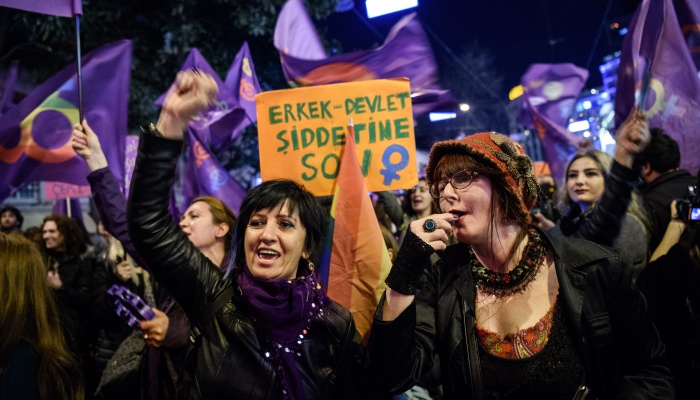Nearly 40 percent of women in Turkey subjected to violence, says HRW senior Turkey researcher

By Turkish Minute
- May 28, 2022
Around four out of 10 women in Turkey have suffered physical and/or sexual violence during their lives, said Emma Sinclair Webb, Human Rights Watch (HRW) senior Turkey researcher with the Europe and Central Asia division, in an interview with her colleague Birgit Schwarz, the Stockholm Center for Freedom reported.
In the interview, Sinclair introduced a new report prepared by HRW titled “Combatting Domestic Violence in Turkey: The Deadly Impact of Failure to Protect.” According to the report, the Turkish state failed to provide effective protection from domestic violence.
Webb said this was unacceptable as nearly 40 percent of women suffered from violence or stalking. Moreover, hundreds of femicide cases were recorded each year by women’s rights groups and independent media.
Webb explained that the Turkish government had a very conservative approach to combatting violence.
“Turkey’s president is on record opposing gender equality and it has been written out of government policy,” she said. “So while we are seeing government efforts to tackle violence against women, the government simultaneously undermines its own efforts by not seeing the fight against domestic violence as part of promoting women’s rights or ensuring gender equality.”
Emphasizing that although Turkey had laws protecting women against domestic violence, Webb said there was an enormous problem with enforcing these laws and prosecuting perpetrators of violence.
She explained that courts issue a fine or suspend sentences on the condition that the perpetrator does not reoffend within five years. “The authorities are failing to undertake effective risk assessments and don’t ensure the orders are observed. This leaves domestic violence survivors at risk even when they have reported abuse,” Webb added.
Webb said most femicides could possibly have been prevented had authorities paid attention to the women’s previous complaints.
In one case, Ayşe Tuba Arslan complained 23 times about her husband’s abusive behavior. Arslan was killed after divorcing him, but only three weeks before her death was her husband prosecuted for publicly threatening to “shoot and kill” her. However, the sentence was suspended on condition that he did not repeat the offense.
According to Webb, in order to better protect women authorities need to be more consistent in collecting data. “Police and courts need to get better at risk assessment and at spotting warning signs,” she said. “And breaches of restraining orders need to be penalized more resolutely.
Webb added that social media had become instrumental in raising public awareness against gender-based violence but said it was worrying that authorities needed such public pressure to take action.
Femicides and violence against women are serious problems in Turkey, where women are killed, raped or beaten every day.
According to the We Will Stop Femicide Platform (Kadın Cinayetlerini Durduracağız Platformu), 280 women were murdered in Turkey in 2021.
Webb said the Istanbul Convention was very important for combatting gender-based violence and establishing equality.
The Council of Europe Convention on Preventing and Combating Violence against Women and Domestic Violence, better known as the Istanbul Convention, is an international accord designed to protect women’s rights and prevent domestic violence in societies and was opened to the signature of member countries of the Council of Europe in 2011.
Turkish President Recep Tayyip Erdoğan sparked outrage in Turkey and the international community after he issued a decree in March 2021 that pulled the country out of the international treaty, which requires governments to adopt legislation prosecuting perpetrators of domestic violence and similar abuse as well as marital rape and female genital mutilation.
Since Turkey’s withdrawal from the treaty, Turkish authorities have been pressuring women’s rights organizations over their activist work.
No comments:
Post a Comment